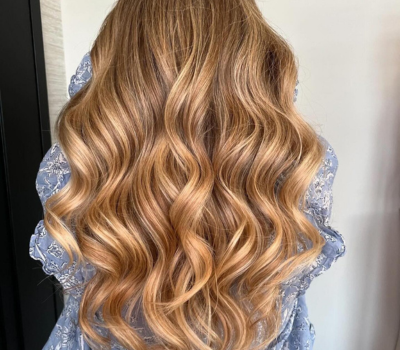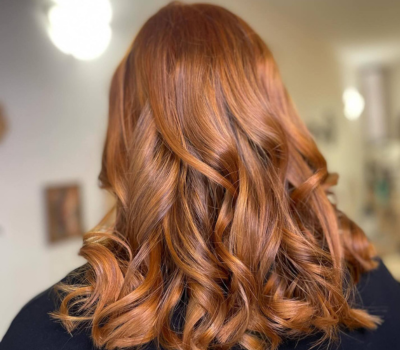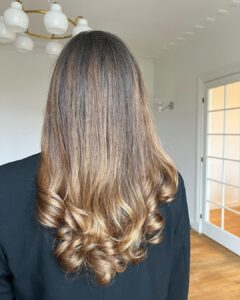The quest for lighter, more luminous hair has always captivated the collective imagination. Traditionally, chemical bleaching has been the method of choice for achieving this enviable radiance, but at what price? With side effects ranging from hair damage to health risks, more and more people are turning to natural alternatives to avoid these ills. In this article, we explore the world of natural solutions for lightening hair without resorting to aggressive bleaching, while preserving its health.
What is hair bleaching?
Hair bleaching is a chemical process that removes the hair's natural color to lighten it. This process generally uses powerful oxidizing agents, such as hydrogen peroxide and ammonia, which open up the hair cuticle to allow these products to penetrate and dissolve the natural pigments.
Why do people bleach their hair?
- Change appearance: The most common reason is to change their appearance and experiment with a new look.
- Homogenize the color: Fading also creates a uniform base for the application of other colors.
- Fashion effects : Cultural influences and social media trends play a crucial role in the growing popularity of bleaching.
The disadvantages of hair bleaching
Hair damage
The chemicals used for bleaching can weaken the hair fiber, leading to increased porosity, breakage and dryness. Chemically-treated hair often loses its elasticity and suffers from split ends, making even simple brushing a nuisance.
Health problems associated with discoloration
In addition to the harmful effects on hair, bleaching can also cause health problems. Chemical fumes can cause respiratory irritation, skin allergies and even severe reactions in sensitive individuals. What's more, prolonged and frequent exposure to these products can pose more serious long-term health risks.
So it's natural to look for gentle, effective alternatives that respect both the hair and our general well-being.

Natural alternatives for lightening hair
If you're looking for ways to lighten your hair without the harmful effects of chemical bleaching, there are several natural alternatives. Here are a few solutions that can help you achieve brighter highlights while preserving the health of your hair.
Honey and apple cider vinegar
Benefits of honey for hair
Honey is a natural ingredient with gentle lightening properties thanks to a few traces of hydrogen peroxide it naturally contains. What's more, it's rich in nutrients and offers moisturizing benefits for hair, improving its overall health.
How to use honey and apple cider vinegar to lighten hair
- Combine one part honey with an equal part apple cider vinegar.
- Apply the mixture to damp hair, making sure it is evenly distributed.
- Leave on for an hour under a shower cap to intensify the effect.
- Rinse thoroughly and repeat once a week for optimum results.
Lemon juice and chamomile
The benefits of lemon juice for hair
Lemon juice is a natural lightening agent thanks to its high citric acid content. This acid is capable of lightening hair pigments when activated by the sun's heat.
How to use lemon juice and chamomile to lighten hair
- Prepare an infusion of chamomile and leave to cool.
- Mix with the juice of two freshly squeezed lemons.
- Apply the mixture to your hair and expose it to the sun for about 30 minutes.
- Rinse and moisturize to prevent dryness.
Cinnamon and conditioner
The benefits of cinnamon for hair
Cinnamon is renowned for its ability to naturally lighten hair color and stimulate blood circulation to the scalp, which also promotes hair growth.
How to use cinnamon and conditioner to lighten hair
- Add a tablespoon of cinnamon to your usual conditioner.
- Apply generously to hair, concentrating on the areas you wish to lighten.
- Cover your hair with a shower cap and leave on overnight.
- Rinse off the next morning and enjoy the results after a few applications.
Bicarbonate
Baking soda is another natural option that can help lighten hair without the harshness of chemicals. Although often used to cleanse hair, baking soda can also help reduce dark hair color when used judiciously.
- Mix baking soda with lukewarm water to form a paste.
- Apply the paste evenly to your hair and leave for 15 minutes.
- Rinse thoroughly with a mild shampoo to avoid drying out the scalp.
See also: Brewer's yeast: an ally against hair loss?
How to choose the best alternative for lightening your hair?
Taking a natural approach to lightening your hair is not only good for your hair's health, it also reduces your ecological footprint. However, not all natural alternatives are suitable for everyone. Here's how to choose the most appropriate method for your needs and hair type.
Assess your hair type and condition
Before choosing a specific method, it's essential to consider your hair type and its current condition. Fine, thick, curly or straight hair will react differently to different treatments.
- Fine hair : Avoid overly acidic or abrasive solutions that could weaken your hair. Opt for gentle methods such as honey and apple cider vinegar.
- Thick hair : Baking soda can be a good option for adding lightness while preserving hair density.
- Curly hair : Choose methods that moisturize and nourish, such as cinnamon mixed with a rich conditioner.
- Dry or damaged hair: Thanks to its moisturizing properties, honey is ideal for adding softness and shine without damaging the hair fiber.
Test the sensitivity of your scalp
A crucial step before applying any treatment is to check the sensitivity of your scalp. Natural ingredients can sometimes cause allergic reactions. Here's how to test them:
- Apply a small amount of the chosen ingredient or mixture to the wrist or behind the ear.
- Leave on for 24 hours and watch for signs of irritation, itching or redness.
- If no reaction occurs, the treatment is probably safe for your scalp.
Considerations on time and regularity
Your choice of method should also take into account the time you are prepared to devote to the process and the frequency of applications.
- For fast results: Lemon juice and chamomile offer visible brightening from the very first application, especially when activated by natural sunlight.
- For gradual brightening: Honey and cinnamon require several applications, but guarantee a gentle, gradual change in hair color.
Adapting the method to the seasons
Depending on the season, certain methods may be more effective or practical. In summer, the use of lemon juice is advantageous due to the abundance of sunshine. In winter, when sun exposure is limited, it may be wiser to opt for treatments you can apply before bed, such as the cinnamon mask.
Consider desired results
The end result you want to achieve in the long term should also influence your choice:
- Subtle clarification: Apple cider vinegar in combination with honey will provide a natural radiance without drastic changes.
- More pronounced lights : For a stronger effect, heat-activated lemon juice is a viable option.
Choose the method that best suits your needs, and make sure you always test natural products on a small section of hair before a full application. This way, you can enjoy safe, effective lightening that preserves the beauty and health of your hair.
Precautions and advice for using natural methods
Knowing the limits of natural lightening
Natural methods can provide slight lightening and improve hair shine, but they don't offer a radical transformation like chemicals. It's essential to set realistic expectations about the level of lightening you can achieve naturally.
Importance of hair care
Hydration and nutrition
Whatever natural treatment you choose, it's crucial to moisturize your hair regularly. Nourishing masks and hair oils are your best allies. For example, argan or coconut oil can be applied to preserve the softness and shine of lightened hair.
Avoid excessive use
It may be tempting to multiply applications to speed up the lightening process, but this can weaken your hair. Limit treatments to once or twice a week to maintain hair health.
Frequently asked questions (FAQ)
1. How long does it take to see the results?
Results vary according to the method used and your hair's natural color. Most people notice subtle changes after three to four applications.
2. Do these methods work on all hair types?
Yes, but effectiveness varies considerably according to initial hair color and texture. In general, lighter hair will benefit more from these methods than very dark hair.
3. Is natural lightening less damaging to the hair?
Absolutely. Natural methods reduce the risk of severe damage compared to chemical methods, although some options like lemon may require monitoring to avoid drying out.
4. Can I use several methods at the same time to speed up the process?
It's best not to combine several methods without evaluating their effects individually, as this could lead to over-treatment and damage to the hair.
5. What's the best method for sensitive hair?
Honey mixed with apple cider vinegar is recommended for sensitive hair, as it offers the dual benefit of lightening while preserving moisture.
Conclusion
Natural alternatives for lightening your hair present a viable solution for those seeking a gentle, environmentally-friendly approach. Using affordable ingredients, you can achieve a subtle hair transformation while preserving the health of your hair. By adopting the right practices and observing safety precautions, you can enjoy more luminous locks while guaranteeing the longevity and vitality of your hair.



